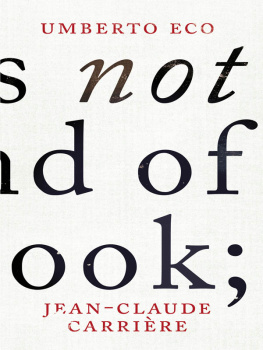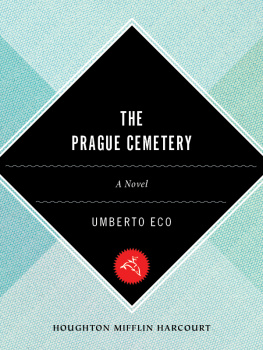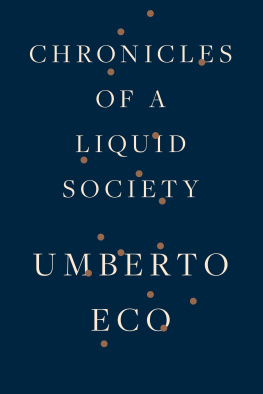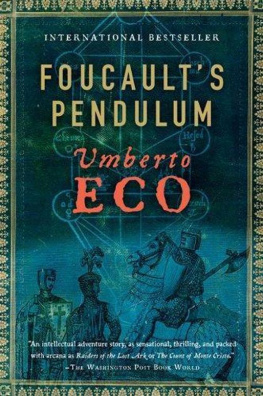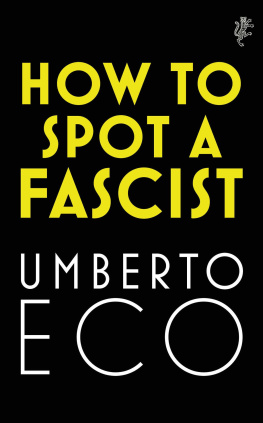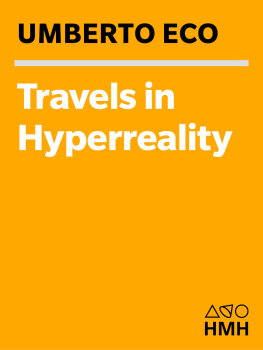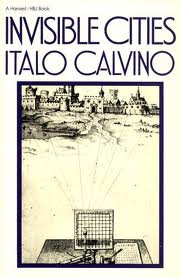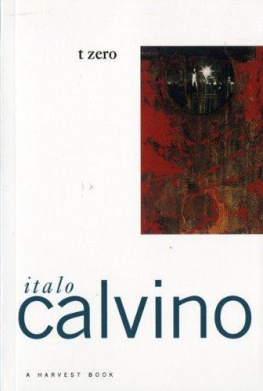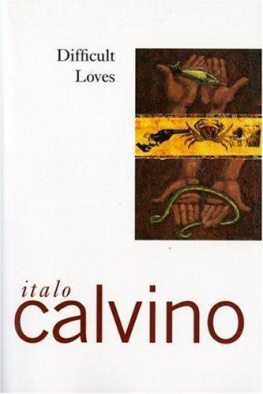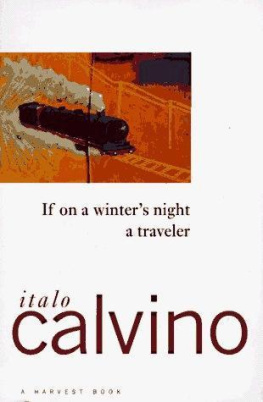Umberto Eco - Travels in hyper reality : essays
Here you can read online Umberto Eco - Travels in hyper reality : essays full text of the book (entire story) in english for free. Download pdf and epub, get meaning, cover and reviews about this ebook. City: San Diego, year: 1986, publisher: Mariner Books; HBJ, genre: Art. Description of the work, (preface) as well as reviews are available. Best literature library LitArk.com created for fans of good reading and offers a wide selection of genres:
Romance novel
Science fiction
Adventure
Detective
Science
History
Home and family
Prose
Art
Politics
Computer
Non-fiction
Religion
Business
Children
Humor
Choose a favorite category and find really read worthwhile books. Enjoy immersion in the world of imagination, feel the emotions of the characters or learn something new for yourself, make an fascinating discovery.
- Book:Travels in hyper reality : essays
- Author:
- Publisher:Mariner Books; HBJ
- Genre:
- Year:1986
- City:San Diego
- Rating:3 / 5
- Favourites:Add to favourites
- Your mark:
- 60
- 1
- 2
- 3
- 4
- 5
Travels in hyper reality : essays: summary, description and annotation
We offer to read an annotation, description, summary or preface (depends on what the author of the book "Travels in hyper reality : essays" wrote himself). If you haven't found the necessary information about the book — write in the comments, we will try to find it.
Travels in hyper reality : essays — read online for free the complete book (whole text) full work
Below is the text of the book, divided by pages. System saving the place of the last page read, allows you to conveniently read the book "Travels in hyper reality : essays" online for free, without having to search again every time where you left off. Put a bookmark, and you can go to the page where you finished reading at any time.
Font size:
Interval:
Bookmark:
Copyright 1983, 1976, 1973 by Gruppo Editoriale Fabbri-Bompiani, Sonzogno, Etos S.p.A.
English translation copyright 1986 by Harcourt, Inc.
Copyright 1986, 1967 by Umberto Eco
All rights reserved. No part of this publication may be reproduced or transmitted in any form or by any means, electronic or mechanical, including photocopy, recording, or any information storage and retrieval system, without permission in writing from the publisher.
For information about permission to reproduce selections from this book, write to Permissions, Houghton Mifflin Harcourt Publishing Company, 215 Park Avenue South, New York, New York 10003.
www.hmhco.com
Some of the translated essays previously appeared in Sette anni di desiderio; Il costumedi casa; and Dolla periferia dellImpero.
The selections in this volume were translated from the Italian by William Weaver, except for the following: Dreaming of the Middle Ages, Casablanca, De Interpretatione, and A Theory of Expositions.
The English texts of these selections we revised by William Weaver.
De Interpretatione was translated by Christine Leefeldt.
Copyright 1977 by The Regents of the University of California; reprinted from Film Quarterly, 30, no. 4 (summer 1977), pp. 812, by permission of The Regents.
Excerpts from The History of Sexuality by Michel Foucault are reprinted by permission of the publisher, Pantheon Books, a division of Rondom House, Inc.
The Library of Congress has cataloged the print edition as follows:
Eco, Umberto.
Travels in hyperreality
A Helen and Kurt Wolff book.
I. Title.
PQ4865.C6T7 1986 085C.1 85-24810
ISBN 0-15-191079-0
ISBN 0-15-691321-6 (Harvest. pbk.)
e ISBN 978-0-547-54596-7
v1.0614
An American interviewer once asked me how I managed to reconcile my work as a scholar and university professor, author of books published by university presses, with my other work as what would be called in the United States a columnistnot to mention the fact that, once in my life, I even wrote a novel (a negligible incident and, in any case, an activity allowed by the constitution of every democratic nation). It is true that along with my academic job, I also write regularly for newspapers and magazines, where, in terms less technical than in my books on semiotics, I discuss various aspects of daily life, ranging from sport to politics and culture.
My answer was that this habit is common to all European intellectuals, in Germany, France, Spain, and, naturally, Italy: all countries where a scholar or scientist often feels required to speak out in the papers, to comment, if only from the point of view of his own interests and special field, on events that concern all citizens. And I added, somewhat maliciously, that if there was any problem with this it was not my problem as a European intellectual; it was more a problem of American intellectuals, who live in a country where the division of labor between university professors and militant intellectuals is much more strict than in our countries.
It is true that many American university professors write for cultural reviews or for the book page of the daily papers. But many Italian scholars and literary critics also write columns where they take a stand on political questions, and they do this not only as a natural part of their work, but also as a duty. There is, then, a difference in patterns of culture. Cultural anthropologists accept cultures in which people eat dogs, monkeys, frogs, and snakes, and even cultures where adults chew gum, so it should be all right for countries to exist where university professors contribute to the newspapers.
The essays chosen for this book are articles that, over the years, I wrote for daily papers and weekly magazines (or, on occasion, monthly reviews, but not strictly academic journals). Some of them may discuss, perhaps over a period of time, the same problems. Others are mutually contradictory (but, again, always over a period of time). I believe that an intellectual should use newspapers the way private diaries and personal letters were once used. At white heat, in the rush of an emotion, stimulated by an event, you write your reflections, hoping that someone will read them and then forget them. I dont believe there is any gap between what I write in my academic books and what I write in the papers. I cannot say precisely whether, for the papers, I try to translate into language accessible to all and apply to the events under consideration the ideas I later develop in my academic books, or whether it is the opposite that happens. Probably many of the theories expounded in my academic books grew gradually, on the basis of the observations I wrote down as I followed current events.
At the academic level I concern myself with the problems of language, communication, organization of the systems of signs that we use to describe the world and to tell it to one another. The fact that what I do is called semiotics should not frighten anyone. I would still do it if it were called something else.
When my novel came out in the United States, the newspapers referred to semiotics as an arcane discipline. I would not want to do anything here to dispel the arcanum and reveal what semiotics is to those who perhaps have no need to know. I will say only that if, in these travel notes, these thoughts about politics, these invectives against sport, these meditations on television, I have said things that may interest somebody, it is also because I look at the world through the eyes of a semiologist.
In these pages I try to interpret and to help others interpret some signs. These signs are not only words, or images; they can also be forms of social behavior, political acts, artificial landscapes. As Charles S. Peirce once said, A sign is something by knowing which we know something more.
But this is not a book of semiotics. God forbid. There already exist too many people who present as semiotics things that are not semiotics, all over the world; I do not want to make matters worse.
There is another reason why I write these things. I believe it is my political duty. Here again I owe the American reader an explanation. In the United States politics is a profession, whereas in Europe it is a right and a duty. Perhaps we make too much of it, and use it badly; but each of us feels the moral obligation to be involved in it in some way. My way of being involved in politics consists of telling others how I see daily life, political events, the language of the mass media, sometimes the way I look at a movie. I believe it is my job as a scholar and a citizen to show how we are surrounded by messages, products of political power, of economic power, of the entertainment industry and the revolution industry, and to say that we must know how to analyze and criticize them.
Perhaps I have written these things, and go on writing similar things, for other reasons. I am anxious, insecure, and always afraid of being wrong. What is worse, I am always afraid that the person who says I am wrong is better than I am. I need to check quickly the ideas that come into my head. It takes years to write an academic book, and then you have to wait for the reviews, and then correct your own thinking in the later editions. It is work that demands time, peace of mind, patience. I am capable of doing it, I believe, but in the meanwhile I have to allay my anxiety. Insecure persons often cannot delay for years, and it is hard for them to develop their ideas in silence, waiting for the truth to be suddenly revealed to them. That is why I like to teach, to expound still-imperfect ideas and hear the students reaction. That is why I like to write for the newspapers, to reread myself the next day, and to read the reactions of others. A difficult game, because it does not always consist of being reassured when you meet with agreement and having doubts when you are faced with dissent. Sometimes you have to follow the opposite course: Distrust agreement and find in dissent the confirmation of your own intuitions. There is no rule; there is only the risk of contradiction. But sometimes you have to speak because you feel the moral obligation to say something, not because you have the scientific certainty that you are saying it in an unassailable way.
Next pageFont size:
Interval:
Bookmark:
Similar books «Travels in hyper reality : essays»
Look at similar books to Travels in hyper reality : essays. We have selected literature similar in name and meaning in the hope of providing readers with more options to find new, interesting, not yet read works.
Discussion, reviews of the book Travels in hyper reality : essays and just readers' own opinions. Leave your comments, write what you think about the work, its meaning or the main characters. Specify what exactly you liked and what you didn't like, and why you think so.



